被动语态的翻译
- 格式:pptx
- 大小:268.23 KB
- 文档页数:29
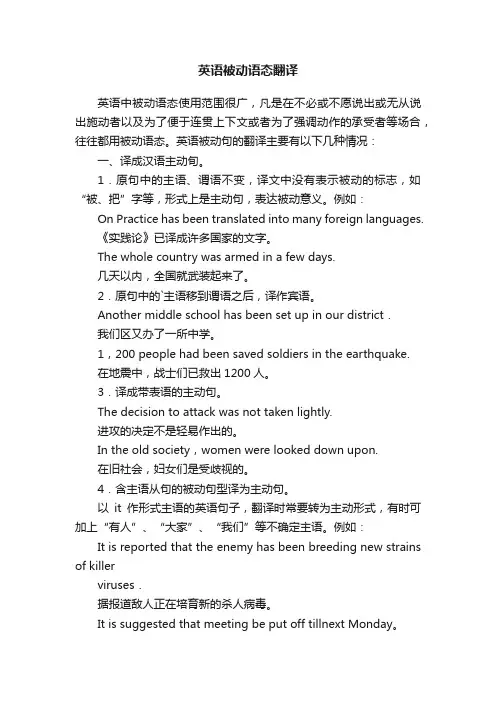
英语被动语态翻译英语中被动语态使用范围很广,凡是在不必或不愿说出或无从说出施动者以及为了便于连贯上下文或者为了强调动作的承受者等场合,往往都用被动语态。
英语被动句的翻译主要有以下几种情况:一、译成汉语主动旬。
1.原句中的主语、谓语不变,译文中没有表示被动的标志,如“被、把”字等,形式上是主动句,表达被动意义。
例如:On Practice has been translated into many foreign languages.《实践论》已译成许多国家的文字。
The whole country was armed in a few days.几天以内,全国就武装起来了。
2.原句中的`主语移到谓语之后,译作宾语。
Another middle school has been set up in our district.我们区又办了一所中学。
1,200 people had been saved soldiers in the earthquake.在地震中,战士们已救出1200人。
3.译成带表语的主动句。
The decision to attack was not taken lightly.进攻的决定不是轻易作出的。
In the old society,women were looked down upon.在旧社会,妇女们是受歧视的。
4.含主语从句的被动句型译为主动句。
以it作形式主语的英语句子,翻译时常要转为主动形式,有时可加上“有人”、“大家”、“我们”等不确定主语。
例如:It is reported that the enemy has been breeding new strains of killerviruses.据报道敌人正在培育新的杀人病毒。
It is suggested that meeting be put off tillnext Monday。
有人建议会议推迟到下星期一举行。
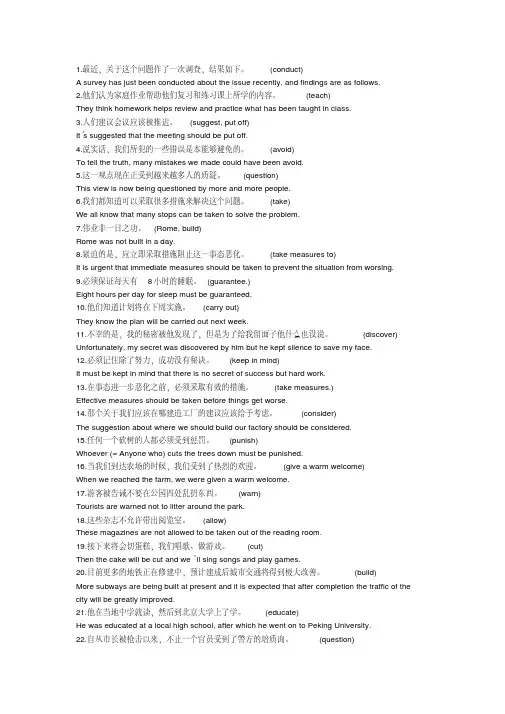
1.最近,关于这个问题作了一次调查,结果如下。
(conduct)A survey has just been conducted about the issue recently, and findings are as follows.2.他们认为家庭作业帮助他们复习和练习课上所学的内容。
(teach)They think homework helps review and practice what has been taught in class.3.人们建议会议应该被推迟。
(suggest, put off)It’s suggested that the meeting should be put off.4.说实话,我们所犯的一些错误是本能够避免的。
(avoid)To tell the truth, many mistakes we made could have been avoid.5.这一观点现在正受到越来越多人的质疑。
(question)This view is now being questioned by more and more people.6.我们都知道可以采取很多措施来解决这个问题。
(take)We all know that many stops can be taken to solve the problem.7.伟业非一日之功。
(Rome, build)Rome was not built in a day.8.紧迫的是,应立即采取措施阻止这一事态恶化。
(take measures to)It is urgent that immediate measures should be taken to prevent the situation from worsing.9.必须保证每天有8小时的睡眠。
(guarantee.)Eight hours per day for sleep must be guaranteed.10.他们知道计划将在下周实施。
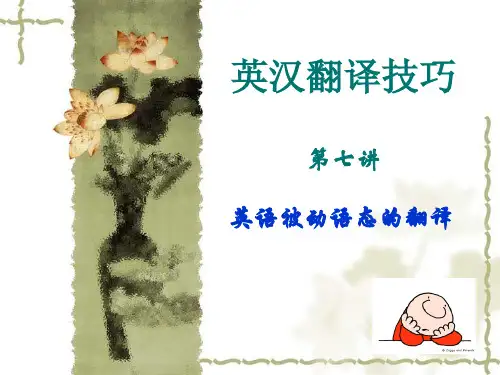
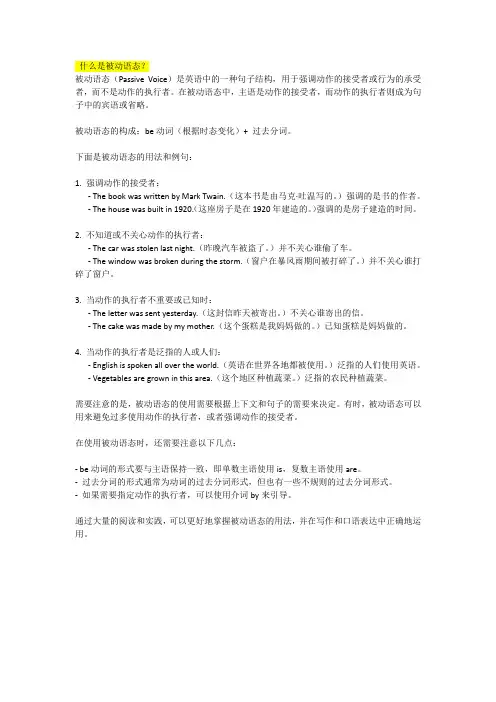
什么是被动语态?被动语态(Passive Voice)是英语中的一种句子结构,用于强调动作的接受者或行为的承受者,而不是动作的执行者。
在被动语态中,主语是动作的接受者,而动作的执行者则成为句子中的宾语或省略。
被动语态的构成:be动词(根据时态变化)+ 过去分词。
下面是被动语态的用法和例句:1. 强调动作的接受者:- The book was written by Mark Twain.(这本书是由马克·吐温写的。
)强调的是书的作者。
- The house was built in 1920.(这座房子是在1920年建造的。
)强调的是房子建造的时间。
2. 不知道或不关心动作的执行者:- The car was stolen last night.(昨晚汽车被盗了。
)并不关心谁偷了车。
- The window was broken during the storm.(窗户在暴风雨期间被打碎了。
)并不关心谁打碎了窗户。
3. 当动作的执行者不重要或已知时:- The letter was sent yesterday.(这封信昨天被寄出。
)不关心谁寄出的信。
- The cake was made by my mother.(这个蛋糕是我妈妈做的。
)已知蛋糕是妈妈做的。
4. 当动作的执行者是泛指的人或人们:- English is spoken all over the world.(英语在世界各地都被使用。
)泛指的人们使用英语。
- Vegetables are grown in this area.(这个地区种植蔬菜。
)泛指的农民种植蔬菜。
需要注意的是,被动语态的使用需要根据上下文和句子的需要来决定。
有时,被动语态可以用来避免过多使用动作的执行者,或者强调动作的接受者。
在使用被动语态时,还需要注意以下几点:- be动词的形式要与主语保持一致,即单数主语使用is,复数主语使用are。
-过去分词的形式通常为动词的过去分词形式,但也有一些不规则的过去分词形式。
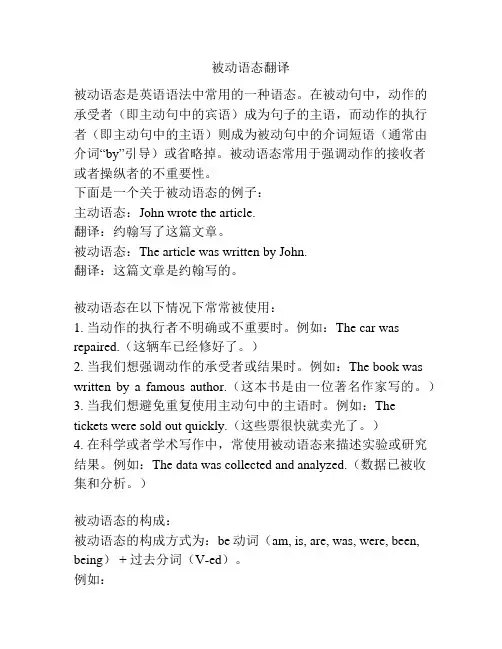
被动语态翻译被动语态是英语语法中常用的一种语态。
在被动句中,动作的承受者(即主动句中的宾语)成为句子的主语,而动作的执行者(即主动句中的主语)则成为被动句中的介词短语(通常由介词“by”引导)或省略掉。
被动语态常用于强调动作的接收者或者操纵者的不重要性。
下面是一个关于被动语态的例子:主动语态:John wrote the article.翻译:约翰写了这篇文章。
被动语态:The article was written by John.翻译:这篇文章是约翰写的。
被动语态在以下情况下常常被使用:1. 当动作的执行者不明确或不重要时。
例如:The car was repaired.(这辆车已经修好了。
)2. 当我们想强调动作的承受者或结果时。
例如:The book was written by a famous author.(这本书是由一位著名作家写的。
)3. 当我们想避免重复使用主动句中的主语时。
例如:The tickets were sold out quickly.(这些票很快就卖光了。
)4. 在科学或者学术写作中,常使用被动语态来描述实验或研究结果。
例如:The data was collected and analyzed.(数据已被收集和分析。
)被动语态的构成:被动语态的构成方式为:be动词(am, is, are, was, were, been, being) + 过去分词(V-ed)。
例如:主动语态:She opens the door.被动语态:The door is opened by her.被动语态也可以用于不同时态和不同人称,只需要根据上述构成方式进行相应的变化。
例如:主动语态:They will finish the project.被动语态:The project will be finished by them.被动语态的使用需要根据上下文和语境来决定,不适合所有情况。



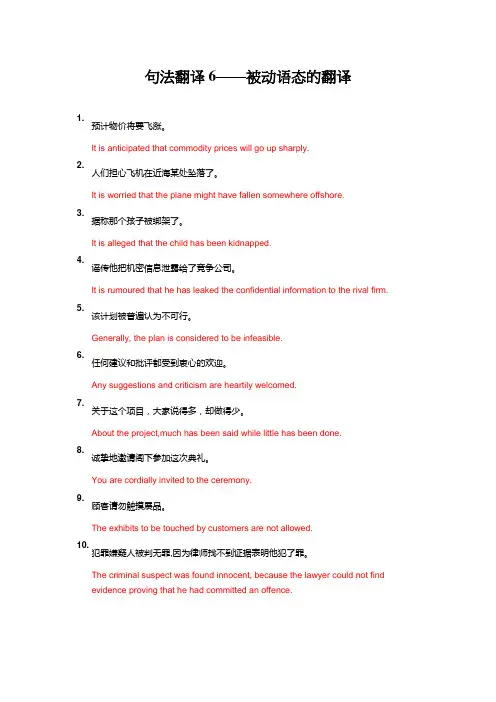
句法翻译6——被动语态的翻译1.预计物价将要飞涨。
It is anticipated that commodity prices will go up sharply.2.人们担心飞机在近海某处坠落了。
It is worried that the plane might have fallen somewhere offshore.3.据称那个孩子被绑架了。
It is alleged that the child has been kidnapped.4.谣传他把机密信息泄露给了竞争公司。
It is rumoured that he has leaked the confidential information to the rival firm.5.该计划被普遍认为不可行。
Generally, the plan is considered to be infeasible.6.任何建议和批评都受到衷心的欢迎。
Any suggestions and criticism are heartily welcomed.7.关于这个项目,大家说得多,却做得少。
About theproject,much has been said while little has been done.8.诚挚地邀请阁下参加这次典礼。
You are cordially invited to the ceremony.9.顾客请勿触摸展品。
The exhibits to be touched by customers are not allowed.10.犯罪嫌疑人被判无罪,因为律师找不到证据表明他犯了罪。
The criminal suspect was found innocent, because the lawyer could not find evidence proving that he had committed an offence.。

第三章汉语被动语态的翻译(学生用)(总7页)--本页仅作为文档封面,使用时请直接删除即可----内页可以根据需求调整合适字体及大小--第三章汉语被动语态的翻译(学生用)(一)汉语被动语态的三种表达方式第一、显性被动1.(被、叫、给、让 + 及物动词)①一朝被蛇咬,十年怕井绳。
A burnt child dreads the fire.A. He who is bitten once by a snake, for ten years will be afraid of a grass rope.B. Once bitten by a snake, he will be afraid of a grass rope for ten years.②他自我感觉总那么好,可这次被冷落了。
He is always full of himself but this time he has been left out in the cold.2.(受、遭受、蒙、蒙受)①龙游浅水遭虾戏了。
A dragon is stranded in shallow water — a gigantic creature is reduced to being teased by shrimps.②翌年楚因战败而蒙辱于秦。
The next year the Kingdom of Chu was humiliated by the Kingdom of Qin due to its military defeat.③公子受宠于君。
You are now in the Emperor’s favour.第二、半隐性被动⑴“为……(所)……”式①茅屋为秋风所破。
The thatched house was destroyed by the autumn storm.②幽王击鼓,诸候兵不至,幽王之身乃死于骊山之下,为天下笑。
King You beat the drum to ask the dukes and princes to send their troops to his rescue but they all refused. King You died at the foot of Mount Li, the object of universal ridicule.(turning himself into a laughing stock)⑵“是……的”式①历史是人民创造的。
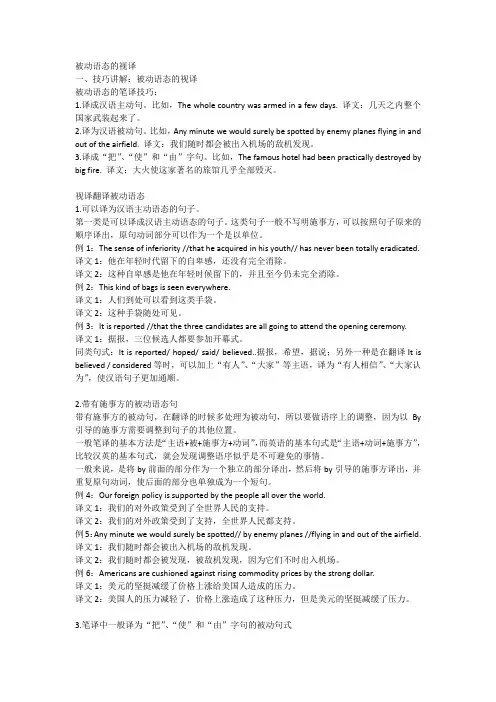
被动语态的视译一、技巧讲解:被动语态的视译被动语态的笔译技巧:1.译成汉语主动句。
比如,The whole country was armed in a few days. 译文:几天之内整个国家武装起来了。
2.译为汉语被动句。
比如,Any minute we would surely be spotted by enemy planes flying in and out of the airfield. 译文:我们随时都会被出入机场的敌机发现。
3.译成“把”、“使”和“由”字句。
比如,The famous hotel had been practically destroyed by big fire. 译文:大火使这家著名的旅馆几乎全部毁灭。
视译翻译被动语态1.可以译为汉语主动语态的句子。
第一类是可以译成汉语主动语态的句子。
这类句子一般不写明施事方,可以按照句子原来的顺序译出,原句动词部分可以作为一个是以单位。
例1:The sense of inferiority //that he acquired in his youth// has never been totally eradicated. 译文1:他在年轻时代留下的自卑感,还没有完全消除。
译文2:这种自卑感是他在年轻时候留下的,并且至今仍未完全消除。
例2:This kind of bags is seen everywhere.译文1:人们到处可以看到这类手袋。
译文2:这种手袋随处可见。
例3:It is reported //that the three candidates are all going to attend the opening ceremony.译文1:据报,三位候选人都要参加开幕式。
同类句式:It is reported/ hoped/ said/ believed..据报,希望,据说;另外一种是在翻译It is believed / considered等时,可以加上“有人”、“大家”等主语,译为“有人相信”、“大家认为”,使汉语句子更加通顺。
什么是被动语态?被动语态(Passive Voice)是英语中的一种语态,用于描述动作或状态的受动者。
在被动语态中,动作或状态的受动者出现在句子的主语位置,而动作或状态的执行者则出现在句子的谓语中,通常使用be动词和过去分词的形式。
被动语态的构成形式为:be(am/is/are/was/were)+ 过去分词,其中be动词的形式由句子的时态和主语的单复数来决定。
例如:- The book was written by Mark Twain.(这本书是马克·吐温写的。
)在这个例子中,被动语态强调的是书的作者,因此“the book”出现在句子的主语位置,而“written”则作为过去分词出现在句子的谓语中。
- The car is being repaired by the mechanic.(这辆车正在被修理师修理。
)在这个例子中,被动语态强调的是车辆的修理情况,因此“the car”出现在句子的主语位置,而“being repaired”则作为现在进行时的被动语态出现在句子的谓语中。
被动语态可以用于以下情况:1. 强调动作或状态的受动者:当强调受动者时,被动语态可以用于将受动者置于句子的主语位置,突出其重要性。
- The letter was written by my boss.(这封信是我老板写的。
)2. 避免指责或责任:当需要避免指责或责任时,被动语态可以用于将动作或状态的执行者省略或放在句子的后面。
- The window was broken.(窗户破了。
)3. 描述普遍真理或自然现象:被动语态可以用于描述普遍真理或自然现象,突出动作或状态的客观性。
- Water is boiled at 100 degrees Celsius.(水在100度摄氏度时沸腾。
)需要注意以下几点:-被动语态通常不适用于无人称主语的情况,例如天气和时间。
-被动语态的使用可能会使句子更加含糊或不直接,因此需要根据具体情况来选择使用被动语态还是主动语态。
什么是被动语态?被动语态(Passive Voice)是英语中的一种语态,用于强调动作的接受者而不是执行者。
在被动语态中,动作的接受者成为主语,而执行者则通常被省略或放在介词“by”后面。
被动语态的构成方式是:助动词be(根据时态变化)+ 动词的过去分词形式。
助动词be的时态和人称要与原句的谓语动词保持一致。
下面是被动语态的一些常见用法:1. 强调动作的接受者:被动语态用于强调动作的接受者,而不是执行者。
这种强调通常在我们想要突出动作的影响或结果时使用。
- The cake was made by my mother.(动作的执行者被省略)- The letter was written by John.(动作的执行者被明确提及)2. 隐藏或省略执行者:在被动语态中,执行者通常被省略或放在介词“by”后面。
这种使用方式常见于不重要或已知的执行者,或者在一般陈述中。
- The car was stolen.(执行者被省略)- The painting was created by a famous artist.(执行者明确提及)3. 科学和学术写作中的常见用法:被动语态在科学和学术写作中经常使用,特别是在描述研究方法、实验过程和观察结果时。
- The data were analyzed using statistical software.(数据的分析过程)- The experiment was conducted in a controlled environment.(实验的执行过程)4. 使句子更加客观:被动语态可以使句子更加客观,突出动作的接受者,而不是执行者。
这在新闻报道、科学研究和法律文件中很常见。
- The suspect was arrested by the police.(被捕者的身份突出)- The decision was made by the committee.(决定的执行者被省略)被动语态在英语中的使用非常常见,可以用于各种语境和场合中。
被动语态的译法(Translation of the Passive)英语中被动语态使用范围很广。
凡是在不必说出主动者、不愿说出主动者、无从说出主动者或者是为了便于连贯上下文等场合,往往都用被动语态。
汉语中虽也有被动语态,但使用范围狭窄得多。
英语被动语态的句子,译成汉语时,很多情况下都可译成主动句,但也有一些可以保持被动语态。
一、译成汉语主动句英语被动语态的句子译成汉语主动句可有几种不同情况:(一)原文中的主语在译文中仍为主语1)The whole country was armed in a few days.几天之内全国武装起来了。
2) The sense of inferiority that he acquired in his youth has never been totally eradicated.他在青少年时期留下的自卑感,还没有完全消除。
3)Most trees are denuded of leaves in winter.大多数树木冬天要落叶。
4)He has been wedded to translation.他与翻译结下了不解之缘。
5)She was delivered of a boy.她生了一个男孩。
6) Visitors are requested to wait.来宾请等候。
7) He was given a prize.他得了奖。
8) I have the honor of being elected.我荣幸地当选了。
(二)原文中的主语在译文中作宾语1)By the end of the war 800 people had been saved by the organization,but at a cost of over 200 Belgian and French lives.战争结束时,这个组织拯救了八百人,但那是以二百多比利时人和法国人的生命为代价的。